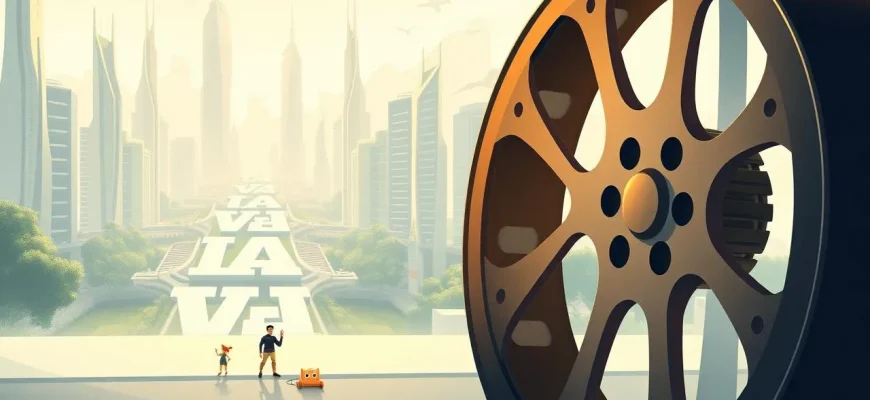Embark on a cinematic journey through utopian landscapes with our curated selection of family-friendly films. These movies not only entertain but also inspire, presenting visions of perfect worlds where harmony, peace, and innovation reign. Whether you're looking for a feel-good movie night or a thought-provoking discussion with your family, these films offer a glimpse into what could be, providing both entertainment and a touch of optimism about the future.

The City of Lost Children (1995)
Description: In a surreal, dystopian world, a scientist kidnaps children to steal their dreams, but one child's brother, a circus strongman, sets out to save him. This film, while dark, has elements of a utopian quest for innocence and purity.
Fact: The film was co-directed by Jean-Pierre Jeunet and Marc Caro, known for their visually stunning and imaginative storytelling.
 Watch Now
Watch Now 
The Truman Show (1998)
Description: Truman Burbank's life is a scripted reality TV show, where he lives in an artificial utopian town. This film raises questions about privacy, reality, and the pursuit of an authentic life.
Fact: The film was shot in a real town called Seaside, Florida, which was designed to look like a perfect community.
 Watch Now
Watch Now 
Pleasantville (1998)
Description: Two modern teenagers are sucked into a 1950s TV show where everything is black and white, and their presence starts to change the utopian, simplistic world into one with color and complexity.
Fact: The film uses color as a metaphor for change and enlightenment, with characters and objects turning from black and white to color as they experience new emotions and ideas.
 Watch Now
Watch Now 
The Matrix (1999)
Description: While not entirely utopian, the Matrix presents a virtual reality where humans live in a simulated utopia, unaware of the harsh reality outside. This film delves into themes of choice, reality, and freedom.
Fact: The film's "bullet time" effect, where the action slows down while the camera moves around, was a groundbreaking visual technique at the time.
 Watch Now
Watch Now 
Equilibrium (2002)
Description: In a future where emotions are outlawed to prevent war, a law enforcement officer begins to question the system after missing his dose of emotion-suppressing drugs. This film explores the idea of a utopia built on the suppression of human nature.
Fact: The film was shot in Berlin, Germany, to take advantage of the city's post-World War II architecture, which helped to create the dystopian atmosphere.
 Watch Now
Watch Now 
The Village (2004)
Description: A small, isolated community lives in harmony, believing they are protected from the outside world by an agreement with the creatures in the woods. This film explores the lengths to which people will go to create their own utopia.
Fact: M. Night Shyamalan wrote the script in just three and a half weeks.
 Watch Now
Watch Now 
The Island (2005)
Description: In a seemingly utopian future where all human needs are catered for, the inhabitants of a secluded facility live in bliss, unaware that they are clones waiting to be harvested for their organs. This film delves into the ethical questions of cloning and the value of human life.
Fact: The film was inspired by several sources, including the 1979 film "Parts: The Clonus Horror," which had a similar premise.
 Watch Now
Watch Now 
The Giver (2014)
Description: In a seemingly perfect community, without war, pain, suffering, differences or choice, a young man is selected to become the Receiver of Memory, the person who stores all the past memories of the time before Sameness. This film explores the beauty and the burden of individuality in a utopian setting.
Fact: The film is based on Lois Lowry's 1993 novel of the same name, which has been banned in some schools due to its themes of euthanasia and infanticide.
 Watch Now
Watch Now 
Tomorrowland (2015)
Description: A young woman discovers a mysterious pin that transports her to an alternate dimension known as Tomorrowland, a place of wonder and innovation. This film celebrates the idea of a better future through science and imagination.
Fact: The film's title was inspired by the iconic Tomorrowland section of Disney theme parks, which itself was inspired by the idea of a utopian future.
 Watch Now
Watch Now 
WALL-E (2008)
Description: In a future where Earth has become uninhabitable, a small waste-collecting robot named WALL-E finds love and purpose, leading to a journey that could save humanity. This Pixar film offers a vision of a utopian future where technology and nature can coexist.
Fact: WALL-E was the first Pixar film to be released with a PG rating in the United States.
 30 Days Free
30 Days Free 








